WAERN
For those of you who are volunteers or employees in organisations such as Bush Fire Brigade, SES, Marine Rescue, St John’s Ambulance, WA Police, Fire and Rescue and various other Government agencies, you will be familiar with the WAERN radio system. WAERN is the acronym for Western Australian Emergency Radio Network, a $20mil program initially rolled out by the state government back in 2006. The primary aim of this revolutionary new radio system was to significantly improve communications between different emergency agencies. Back in the day, agencies had independent radio communication systems making it extremely difficult, often impossible, to communicate between each other during ‘multi agency’ incidents. During the last ten years or so there have many incidents meeting this criteria, including three people washed off Black Point, swimmers washed out to sea at Redgate Beach, the Margaret River fires and more recently the Hamelin Bay whale beachings. Without getting too technical, these dual band radios allow communications on both the UHF and VHF band and can even be setup as a repeater if required. From a marine rescue point of view, we predominantly use marine VHF radios, which are excellent when communicating between vessels, but when you need to liase with land based agencies, often Police and SES in our case, unless we give them a VHF handheld radio, we are relying on mobile phones, when reception is available, which has many limitations.
Margaret River and Augusta Marine Rescue Groups have WAERNs fitted in Mdedicated vessels and vehicles, but it is fair to say that because we have relied almost exclusively on the VHF marine band, the WAERN has been a somewhat ‘neglected’ asset and unless we have a member who is also a firey, tend not to fully utilise it’s capability. So with this in mind, I was asked to run a WAERN training exercise for the Margaret River Marine Rescue Group but was quite prepared to admit my own skills needed upgrading before attempting to train others. After a quick google search, the DFES website pointed me in the direction of the Lower South West SES District Officer, Leon Gardiner, with expertise in WAERN training. I knew I was on a winner straight away, because Leon and I had history. Leon was one of my stand out students in the marine and outdoor program at Busselton High School many years ago. As a young adult he was a mad keen outdoor enthusiast, volunteer SES member, great communicator and extremely reliable. The fact that he had transferred these skills to a career in the industry was fantastic to see.
As it turned out, Leon had to take maternity leave the week before the planned training night to assist with a new born into the family. I thought a reschedule would be necessary, but Leon was committed and prepared to volunteer his time, along with Michael Mackay-Blair, to conduct the training. With sets of training radios, Leon and Michael had a set course but were prepared to customise aspects to cater for marine rescue members’ needs. A huge thank you to Leon and Michael for their commitment to their community and excellent hands on presentation. All members left much more competent to utilise these radios and I would recommend other marine rescue groups request similar training if required.
On a local note, two sea rescue callouts from Gracetown last weekend due to vessel breakdowns had one common theme. Both vessels did not have operational marine radios which delayed both their requests for assistance and the ability to communicate effectively with rescue vessels while on the water. Get a radio guys!

